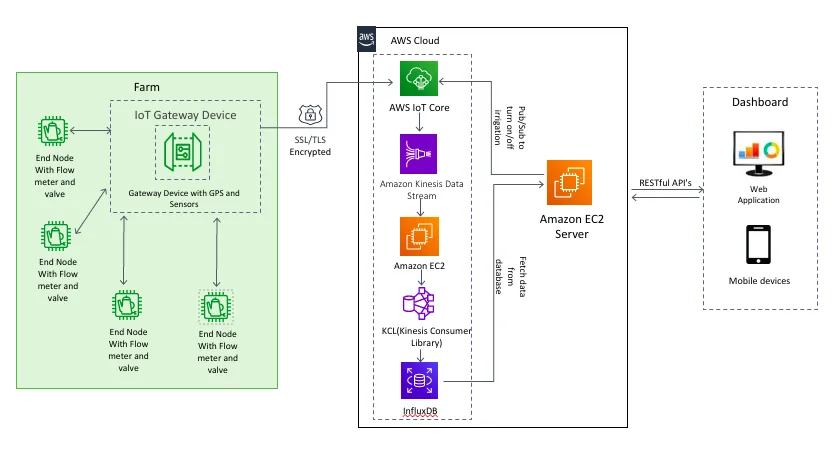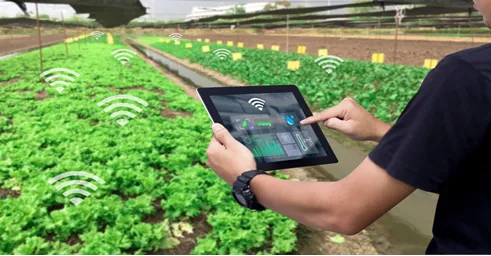Introduction
Smart agriculture is the way of improving farming with
emerging technology.Innovations in farming are still going on
since the invention of the wheel and the plough, the industry
has been adopting new tools and ways of working for
years.Today, as we move into the era of the high-tech farm,
technologies are emerging which disrupt the way farmers
monitor, manage and view every aspect of agriculture. Internet
of Things brought tremendous revolution in farming Industry.
What is smart agriculture?
There are many ways to refer to modern agriculture. For
example, AgriTech refers to the application of technology in
agriculture. Smart agriculture, on the other hand, is mostly
used to indicate the application of IoT solutionsin
agriculture. Although smart agriculture IoT, as well as
industrial IoT in general, aren’t as popular as consumer
connected devices; yet the market is still very dynamic. The
adoption of IoT solutions for agriculture is constantly
growing.
AWS Architecture and Data Collection
In traditional outdoor large-area farming, there has been a
revolution in using key technologies such as communications
networks and networked sensors to monitor crop conditions and
the environment. Agricultural sensors enable farmers to access
real-time data from remote measurement tools that report on
soil moisture, temperature and pH.

-
In Smart farming, end node with various sensors are deployed
in farm which are connected to the IoT Gateway Device.This
gateway has inbuilt GPS and 4G capability.Sensors can
measure insolation (the amount of sun over a given area),
rainfall, wind speed, air temperature and humidity etc.
-
Data which is collected at Gateway is then send to through
MQTT protocol over the internet to AWS IoT Core for
collection, storeing, and analyzing device data.
-
Then this data will be stream through Amazon Kinesis Data
Streams (KDS) which is a massively scalable and durable
real-time data streaming service.The data collected is
available in milliseconds to enable real-time analytics use
cases such as real-time dashboards.
-
Data will be store in Infulx DB which is fast,
high-availability storage and retrieval of time series data
in fields such as operations monitoring, application
metrics, Internet of Things sensor data, and real-time
analytics.
-
This data can be use for further analysis and turning to
automated equipment of smart farming. Using technology, they
can plant, water, maintain and harvest crops with the
highest efficiency, which helps to improve the use of land,
resources and time.
The Benefits of smart farming
-
Data, tons of data, collected by smart agriculture sensors,
e.g.weather conditions, soil quality, crop’s growth progress
or cattle’s health.This data can be used to track the state
of your business in general as well as staff performance,
equipment efficiency, etc.
-
It Provide better control over the internal processes and,
as a result, lower production risks. The ability to foresee
the output of your production allows you to plan for better
product distribution. If you know exactly how much crops you
are going to harvest, you can make sure your product won’t
lie around unsold.
-
Cost management and waste reduction thanks to the increased
control over the production. Being able to see any anomalies
in the crop growth or livestock health, you will be able to
mitigate the risks of losing your yield.
-
Increased business efficiency through process automation. By
using smart devices, you can automate multiple processes
across your production cycle, e.g. irrigation, fertilizing,
or pest control.
-
Enhanced product quality and volumes. Achieve better control
over the production process and maintain higher standards of
crop quality and growth capacity through automationAs a
result, all of these factors can eventually lead to higher
revenue.





